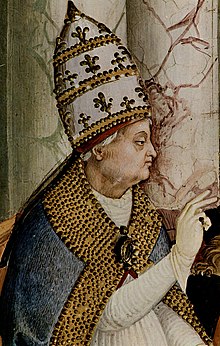
There is a thundering theological dissonance between this (the "Libera me" - the version of which from Faure's Requiem was sung beautifully by the choir last night at the All Souls Mass at St Michael and All Saint's Edinburgh) :
Libera me, Domine, de morte æterna, in die illa tremenda:
Quando cœli movendi sunt et terra.
Dum veneris iudicare sæculum per ignem.
Tremens factus sum ego, et timeo, dum discussio venerit, atque ventura ira.
Quando cœli movendi sunt et terra.
Dies illa, dies iræ, calamitatis et miseriæ, dies magna et amara valde.
Dum veneris iudicare sæculum per ignem.
Requiem æternam dona eis, Domine: et lux perpetua luceat eis.
Deliver me, O Lord, from death eternal on that fearful day,
when the heavens and the earth shall be moved,
when thou shalt come to judge the world by fire.
I am made to tremble, and I fear, till the judgment be upon us, and the coming wrath,
when the heavens and the earth shall be moved.
That day, day of wrath, calamity, and misery, day of great and exceeding bitterness,
when thou shalt come to judge the world by fire.
Rest eternal grant unto them, O Lord: and let light perpetual shine upon them.
and this (the Post Communion collect for All Souls Day from Exciting Holiness used at the same service) :
God of love,
may the death and resurrection of Christ
which we have celebrated in this Eucharist
bring us, with all the faithful departed,
into the peace of your eternal home.
We ask this in the name of Jesus Christ,
our rock and our salvation,
to whom be glory for time and for eternity.
may the death and resurrection of Christ
which we have celebrated in this Eucharist
bring us, with all the faithful departed,
into the peace of your eternal home.
We ask this in the name of Jesus Christ,
our rock and our salvation,
to whom be glory for time and for eternity.
On the one hand, a God who shall judge the world by fire, who make us tremble and fear The Wrath of God. On the other, a God of Love who draws us through the death and resurrection of the only begotten Son into the peace of our eternal home. The two ideas have their own validity (though I have to say I prefer the modern theology but adore the Faure music - my own inner theological dissonance.) but they simply don't sit comfortably side by side in the same liturgy. One of the challenges facing any practising liturgist is how to mesh the best of tradition with the best of the new. And sometimes you just have to admit that the mesh is not actually possible. There's many a Remembrance Sunday that simply never uses "I vow to thee my Country" because the sentiment nicely wrapped in Holst is utterly foreign to modern culture and sensibility. It all works fine if you treat the music simply as a mood setter and ignore its theology, cloaked in luscious notes and hidden in generally incomprehensible Latin (just don't print the English translation in the order of service). If you think that the meaning of what we sing with our lips is just as important as what we say aloud, then there is a problem. Then you have to choose - Ancient or Modern?















